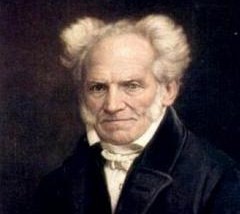| Ballade of Schopenhauer's Philosophy
Wishful to add to my mental power,
Avid of knowledge and wisdom, I
Pondered the Essays of Schopenhauer,
Taking his terrible hills on high.
Worried I was, and a trifle shy,
Fearful I'd find him a bit opaque!
Thus does he say, with a soul-sick sigh:
" The best you get is an even break. "
Life, he says, is awry and sour;
Life, he adds, is sour and awry;
Love, he says, is a withered flower;
Love, he adds, is a dragon-fly;
Love, he swears, is the Major Lie;
Life, he vows, is the Great Mistake;
No one can beat it, and few can tie.
The best you get is an even break.
Women, he says, are clouds that lower;
Women dissemble and falsify.
(Those are things that The Conning Tower
Cannot asseverate or deny.)
Futile to struggle, and strain, and try;
Pleasure is freedom from pain and ache;
The greatest thing you can do is die—
The best you get is an even break.
Gosh! I feel like a real good cry!
Life, he says, is a cheat, a fake.
Well, I agree with the grouchy guy—
The best you get is an even break.
Franklin P. Adams
Weights
and Measures
Doubleday,
Page & Company, New York, 1917
Idealism, and A Reply
There once was a man who said: "God
Must think it exceedingly odd
If he finds that this tree
Continues to be
When there's no one about in the Quad."
Father Ronald Knox
The Complete Limerick Book
ed. Langford Reed
Harrolds
Publishers, London, 1924
Dear Sir,
Your astonishment's odd;
I am always about in the Quad;
And that's why the tree
Will continue to be,
Since observed by
Yours faithfully,
God.
Anon.
The Faber Book of Comic Verse
ed. Michael Roberts
Faber and Faber, London, 1942.
|
|
Some Geese
Ev-er-y child who has the use
Of his sen-ses knows a goose.
See them un-der-neath the tree
Gath-er round the goose-girl's knee,
While she reads them by the hour
From the works of Scho-pen-hau-er.
How pa-tient-ly the geese at-tend!
But do they re-al-ly com-pre-hend
What Scho-pen-hau-er's driv-ing at?
Oh, not at all; but what of that?
Nei-ther do I; nei-ther does she;
And, for that mat-ter, nor does he.
Oliver Herford
A
Child's Primer of Natural History
Charles
Scribner's Sons, New York, 1899
Point of View
Higgledy-piggledy
Marcus Aurelius
Guiding his life by a
Stark rule of thumb,
Garnered the nicknme of
"Impermeabile"
Meaning both "Stoic" and,
Possibly, "dumb."
Anthony Hecht
Jiggery-Pokery
ed. Anthony Hecht and John Hollander
Atheneum,
New York, 1967
Theological
Said Descartes, "I extoll
Myself because I have a soul
And beasts do not." (Of course
He had to put Descartes before the horse.)
Clifton Fadiman
The
Fireside Book of Humorous Poetry
ed. William Cole
Simon
and Schuster, New York, 1959
Reason Has Moons
Reason has moons, but moons not hers
Lie mirror'd on her sea,
Confounding her astronomers,
But, O! delighting me.
Ralph Hodgson
Eve
and Other Poems
At the
Sign of the Flying Flame, London, 1913
Determinism
There once was a man who said: "Damn!
It is borne in upon me I am
An engine that moves
In predestinate grooves
I'm not even a bus, I'm a tram."
Maurice Evan Hare
A Century of Humorous Verse
ed. Roger Lancelyn Green
Dent, London, 1959
|
 The image which may have led you to these rhymes of
philosophy is a portrait of Arthur Schopenhauer. He is the subject
of two of the rhymes, but it is not clear why he is particularly
attractive to writers of light verse.
The image which may have led you to these rhymes of
philosophy is a portrait of Arthur Schopenhauer. He is the subject
of two of the rhymes, but it is not clear why he is particularly
attractive to writers of light verse.
 The image which may have led you to these rhymes of
philosophy is a portrait of Arthur Schopenhauer. He is the subject
of two of the rhymes, but it is not clear why he is particularly
attractive to writers of light verse.
The image which may have led you to these rhymes of
philosophy is a portrait of Arthur Schopenhauer. He is the subject
of two of the rhymes, but it is not clear why he is particularly
attractive to writers of light verse.